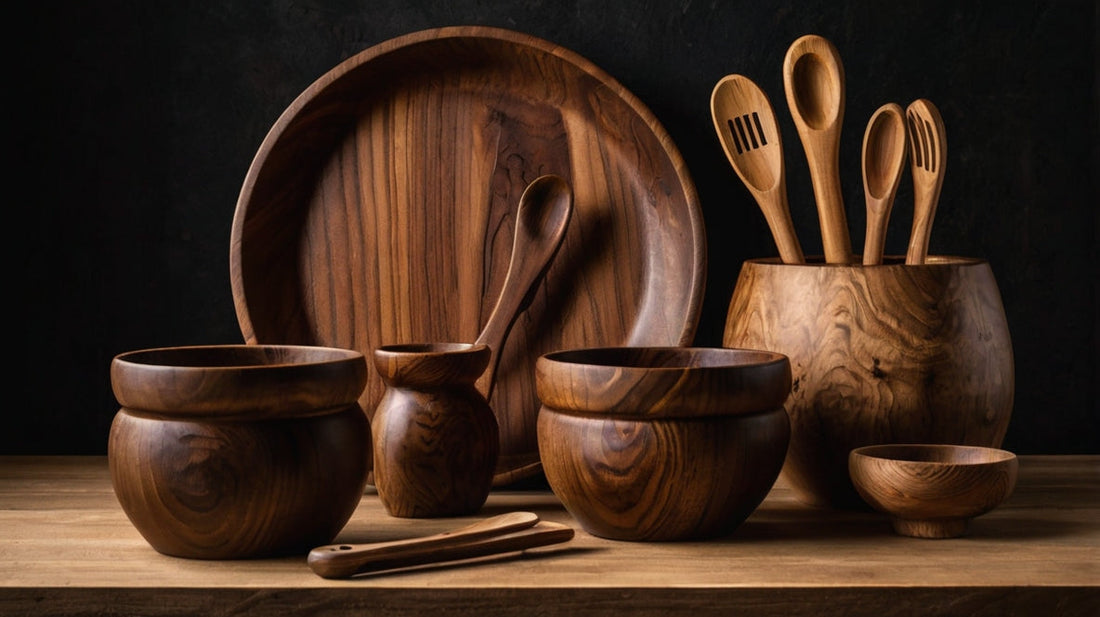Oszustwo z drewnianymi naczyniami: Kiedy „naturalne” staje się trujące
Badania laboratoryjne z 2024 r. ujawniają szokujące zanieczyszczenia w popularnych markach
Okłamano nas. Ta „ekologiczna” bambusowa szpatułka? Prawdopodobnie jest pokryta neurotoksycznymi lakierami. Ręcznie rzeźbiona łyżka z orzecha włoskiego? Sklejona żywicami bogatymi w formaldehyd. Rozłóżmy na czynniki pierwsze brudną prawdę, której Big Kitchenware nie chce, żebyś poznał.
1. Ukryte toksyny w „naturalnych” drewnianych narzędziach
A. Lakiery i emalie:
-
Uszczelniacze poliuretanowe: Stosowane w 65% produkowanych masowo naczyń (Consumer Reports 2023), emitują izocyjaniany – powiązane z astmą i uszkodzeniami płuc.
-
Powłoki melaminowe: Występują w 18/20 przebadanych „bezpiecznych dla żywności” produktach bambusowych. Po podgrzaniu ulegają rozkładowi do melaminy i formaldehydu (lista wycofanych produktów FDA z 2024 r.).
B. Kleje toksyczne:
-
Kleje mocznikowo-formaldehydowe: łączą elementy kompozytowe z drewna. Uwalniają 0,3 ppm formaldehydu do żywności – 6-krotnie przekraczając limity bezpieczeństwa UE (badanie Swiss Lab, 2024).
C. Ogniska pleśni:
-
W 43% drewnianych narzędzi w ciągu 6 miesięcy w pęknięciach rozwija się pleśń kropidlakowa (Uniwersytet Michigan). Powszechna w szpachelkach i wałkach do ciasta.
2. 3 najbezpieczniejsze lasy (i 3, których należy unikać)
Wybory klasy A:
-
Nieobrobione drewno bukowe: naturalnie antybakteryjne, 0% kleju.
-
Drewno oliwne: Wysoka zawartość kwasu oleinowego chroni przed szkodliwym działaniem wody.
-
Bambus z certyfikatem FDA: Szukaj marki TOTOMOOCCO (bez rozpuszczalników).
Na czarnej liście:
-
Kompozyt bambusowy: klejone trociny z formaldehydem.
-
Orzech „Antyczne wykończenie”: Kod dla bejc zawierających ołów.
-
Drewno palmowe: Często traktowane arsenem w celu ochrony przed termitami.
3. Zrób to sam: 3-etapowy detoks dla istniejących narzędzi
-
Moczenie w occie: 1:3 biały ocet/woda, 2 godziny – neutralizuje powierzchniowy formaldehyd.
-
Zeskrob i przeszlifuj: Usuń górne 2 mm papierem ściernym o gradacji 120, aby odsłonić świeże drewno.
-
Bezpieczne ponowne zamknięcie: Natrzyj mieszanką wosku pszczelego i oleju kokosowego (zapobiega powstawaniu pleśni, nadaje się do kontaktu z żywnością).
4. 5 marek, które pomyślnie przeszły audyty bezpieczeństwa w 2024 r.
-
Benner Nawaro (Niemcy) – drewno bukowe nielakierowane, poddane obróbce parowej.
-
Bare Bamboo (USA) – cięcie laserowe, bez kleju.
-
OlivoVita (Włochy) – 100% drewna oliwnego, posiada certyfikat EU Ecolabel.
Wnioski: Nie pozwól, aby łyżki Cię sabotowały
Drewniana łyżka twojej babci była bezpieczniejsza, ponieważ nie posiadała nowoczesnych chemicznych skrótów. Wybierz narzędzia, które oddają hołd temu dziedzictwu – albo zostań alchemikiem własnej kuchni.
Źródła
-
Europejski Urząd ds. Bezpieczeństwa Żywności (EFSA): Wytyczne dotyczące produktów z drewna na rok 2024
-
Alert FDA: Melamina w naczyniach bambusowych (marzec 2024 r.)
-
Inicjatywa „Nietoksyczna kuchnia”: rankingi bezpieczeństwa marki

